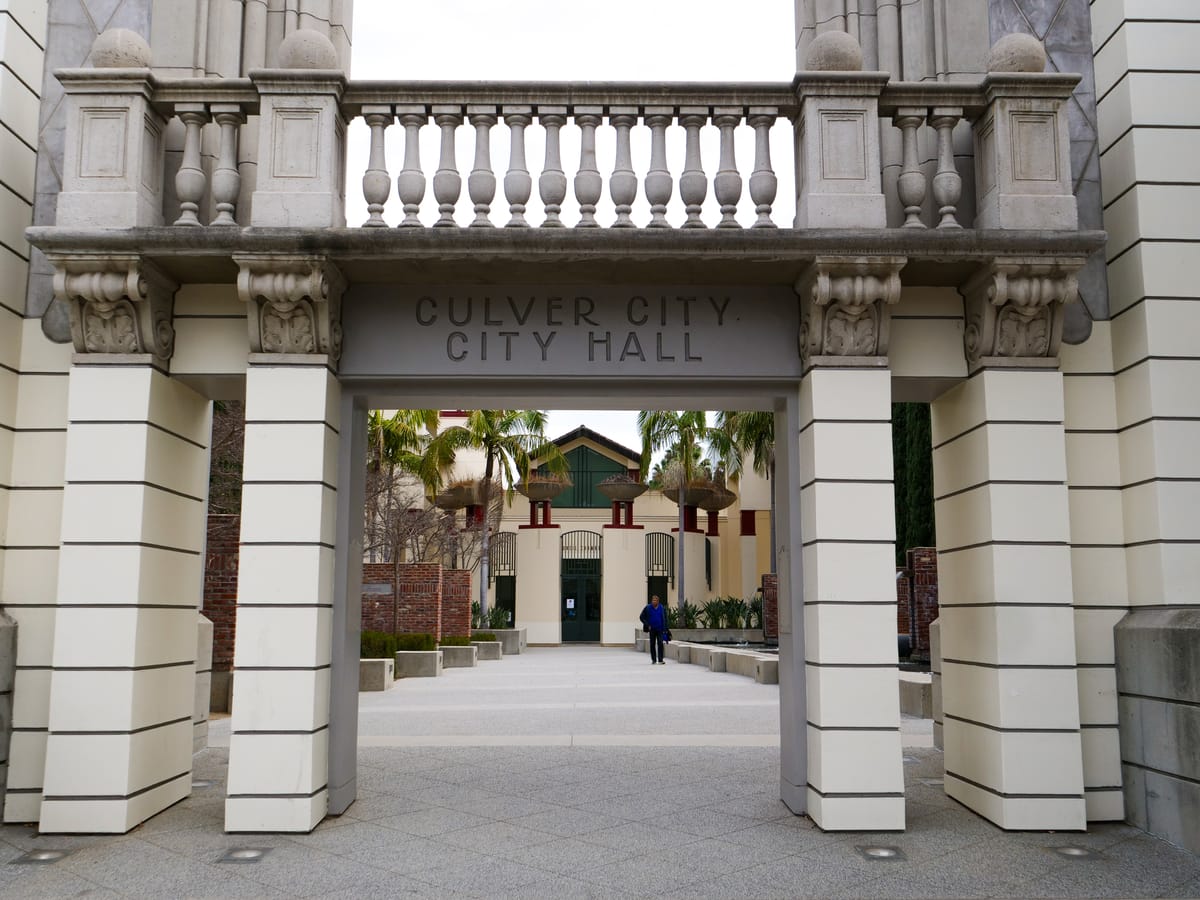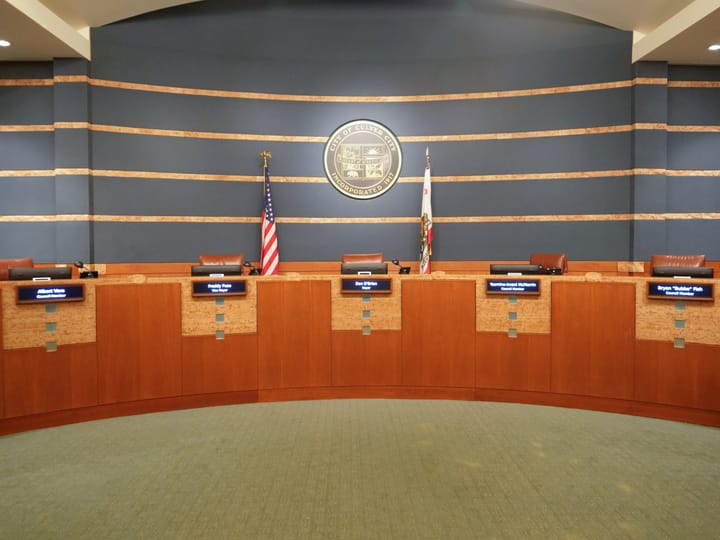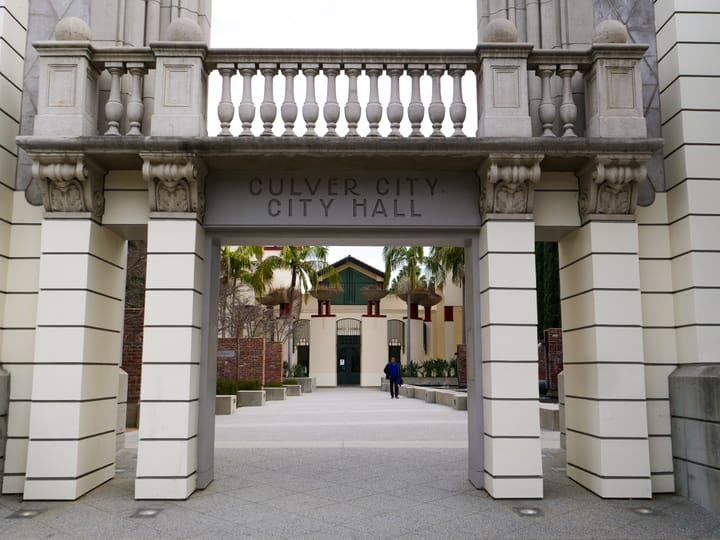Fish, McMorrin lead push for reevaluation of budget process
$250,000 was set aside Tuesday in the city's budget for potential use in an overhaul of Culver City's budget creation process, with a focus on community collaboration.

In an informal 3-2 vote, the city council of Culver City approved a directive Tuesday to allocate $250,000 as part of consideration of reconstructing the city's budget formulation process. While the approval of this proposal has earmarked money, the decision on whether or not the money will be available for this initiative in the approved budget will not be made until the whole budget is finalized at June 9 City Council meeting.
The recommendation was introduced by Councilmember Bubba Fish and co-authored by Councilmember Yasmine-Imani McMorrin. Vice Mayor Freddy Puza provided the necessary support for it to be approved, but Mayor Dan O'Brien and Councilmember Albert Vera cited fiscal and fundamental concerns in their objection to this proposal.
Fish brought this idea forward with the belief that community involvement was necessary for the health of the budget process. He proposed overhauling it to allow residents to engage with the formulation of the city's budget more directly.
"I'm thrilled we set aside funds to help build a more inclusive budget process," Fish said in a statement to Culver Crescent. "As we work to close our ongoing deficit, it's more important than ever that the community helps shape the decisions ahead."
He said the $250,000 estimate came from talks with Healthy Democracy, an organization whose mission is to "elevate the voices of everyday people, bring new faces to public decision making, and design a more collaborative democracy," according to its website. The city did not contract with Healthy Democracy or another entity related to this proposal; Fish only engaged with Healthy Democracy to determine a proper baseline and potential options for his and McMorrin's proposal.
While he expressed appreciation for the staff members' efforts in crafting this budget and educating the public, Fish has been outspoken in his criticism of the city's budget process. He submitted an editorial to Culver Crescent and other publications before the start of the Department Workplan Presentations on Monday, announcing his intention to present the proposal while calling the current process "broken."
"The hope is that one year from now," Fish said at Tuesday's meeting, "the proposed budget in front of us will not only have been thoroughly vetted by the community, but that our community will have worked collaboratively with staff in its development."
Puza inquired about other options the council could consider as part of the discussion, including the concept of a Civic Assembly. The Civic Assembly process involves residents being randomly selected to create a group of 20-40 delegates that is demographically representative of the city to "provide civic insight, information, and recommendations on public policy and its process through in-depth deliberation and productive collaboration."
According to the Healthy Democracy website, civic assemblies have been used to shape policies in several states, but none of these projects has been as broad as a city budget. The city of Eugene, Oregon, used a Civic Assembly to shape Housing Code changes in 2020, but many examples of civic assemblies at work have been primarily focused on one-time issues like determining the use of community sites and creating a plan for COVID recovery in Oregon.
Fish brought up participatory budgeting as another option for a more holistic alternative to the current process. However, the proposal was intentionally left open-ended to allow for discussion and consideration of multiple options based on the input of other council members and the public.
Vera hesitated to commit funds for a process whose specifics have not been ironed out through discussion and consideration of public comment. He remained concerned with addressing the city's fiscal situation and the long term consequences — such as reductions in the city's credit rating — that continuing to drain reserve funds could incur.
"To allocate that kind of money without knowing the mechanics and how this is really going to operate, I can't support this," Vera said.
But McMorrin, who co-authored the proposal with Fish, argued that the 0.15% of the General Fund the proposal represented was a worthwhile investment to ensure future budgets reflect community values. She felt this was an essential way of demonstrating that the city cares about the opinions of residents who feel unheard.
"I think there is a lot of value in making people feel like the city is hearing from them or cares enough to come to their neighborhood to hear what they have to say," McMorrin said.
However, Vera argued that it could be interpreted differently, pointing to the need to remain dedicated to fiscal responsibility as reasons he would not support this proposal.
"As a body, we need to be extremely cautious moving forward," Vera said. "This is a cost that might seem like nothing on the onset, but what is the message we are sending?"
Puza felt that the idea was at least worth exploring. He pointed out that the next step would not be implementation, but discussion of the potential use of the $250,000 in relation to Fish and McMorrin's request.
"The reason I am supporting this the way it is because I want to learn more about it," Puza said. "If the details come back and it is not a viable option, we will vote it down, and the money will go back into the General Fund."
O'Brien disagreed with the movement more fundamentally, resisting the idea that the budget process is "broken," as Fish asserted in his editorial. He pointed out that the city's reserves had been seeing sustained growth for the past decade until the past year, with the deficit this year connected to an uptick in spending on initiatives related to the city's unhoused population.
"The process of [presenting a balanced budget] has been statistically, year-over-year, successful for a long time," O'Brien said. "It has not been broken."
With regards to the overall participation, O'Brien believes "people don't have the bandwidth" for the depth of the process, pointing to the lack of use of the childcare services provided during council meetings as evidence that many residents do not have the time nor the experience for effective participation.
"This is a representative democracy; we are elected to make these decisions," O'Brien said. "What's costly is not just the $250,000...it's a lot of work if you are going to make a dent in the lack of knowledge they are going into the meeting with."
Fish pointed out that other plans in the city that tackle similarly complex topics require significant community outreach as part of their creation, and believed it was important to go beyond education about the budget to ensure residents' values are reflected in its makeup in the same way it is for other city plans.
"We invite public participation on every other major plan," Fish said. "Now, we're finally doing the same for the one that affects them all: the city budget."
EDITOR'S NOTE: This article has been updated with clarification on the decision being made at the June 9 city council meeting.




Comments ()